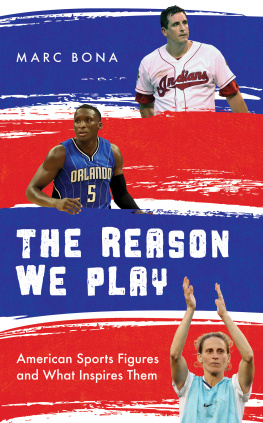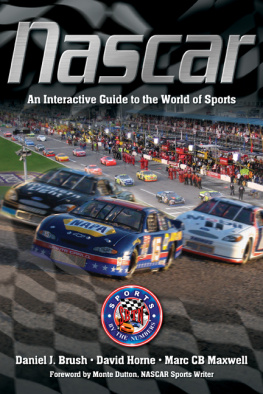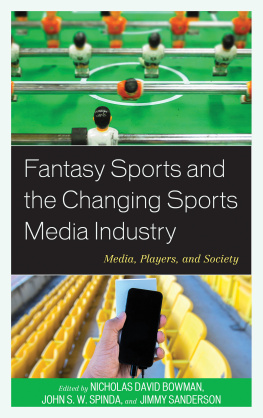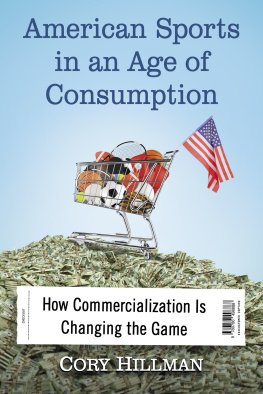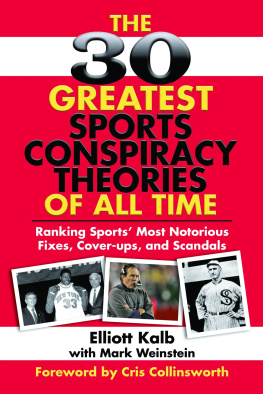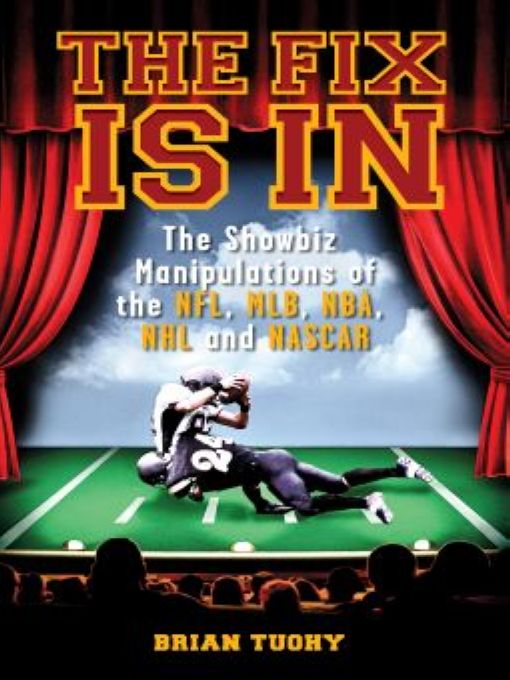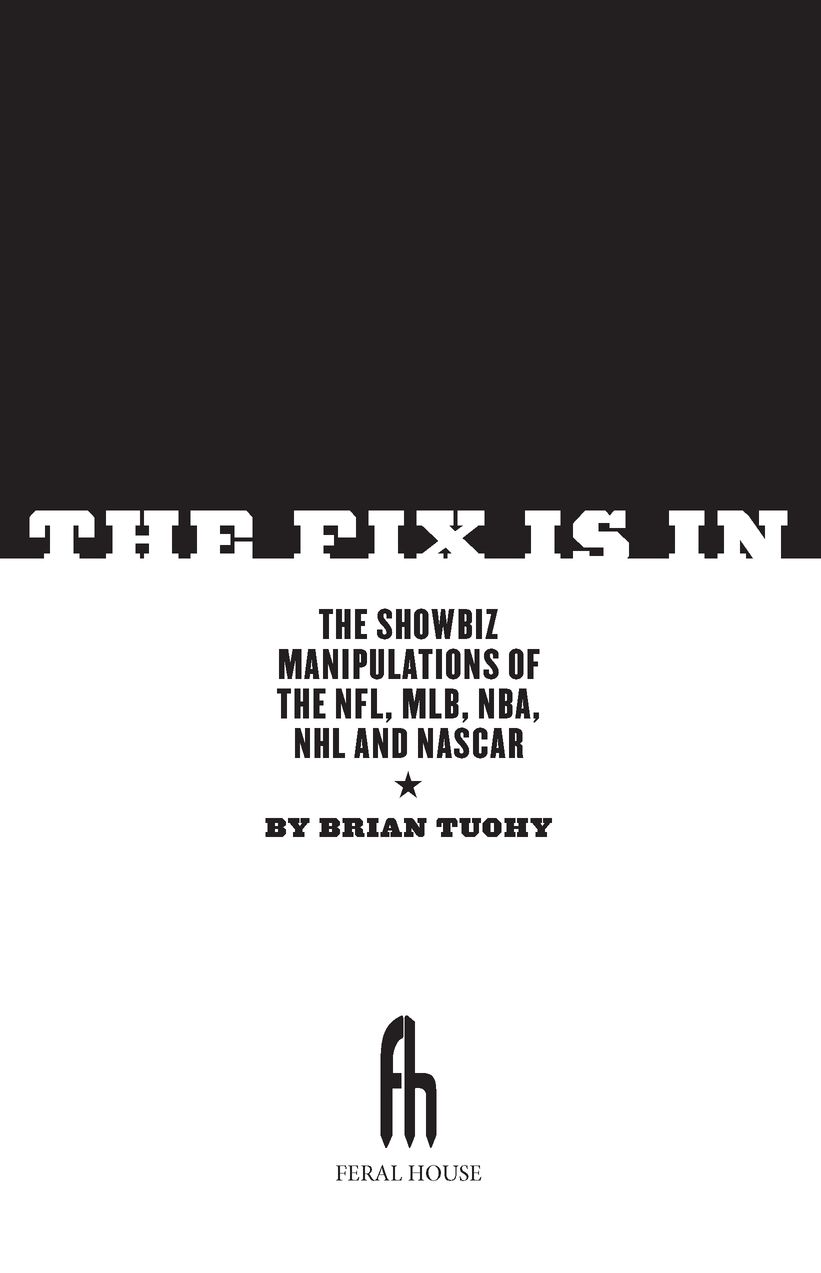Table of Contents
CIRCUS FOR THE HORDES
Pro football provides the circus for the hordes.
Congressman Emanuel Celler (D-NY 1923 - 1973)
THERE ARE TWO HISTORIES OF PROFESSIONAL SPORTS. THERE is the one fans know and cherish, filled with great players, genius coaches, incredible plays, and dynasty teams. It is the history chronicled in each leagues Hall of Fame, the history fans are urged to remember about the games: the moments of struggle, joy, and triumph along with the vast cast of characters that individualized each one of them. Perhaps more than anything, it is this history that has allowed professional sports to mesmerize such a large swath of the population.
There is another history of the sporting world, however, that exists in the shadow created by the glaring spotlight of the sports media. In it the same people exist and the same games take place, yet results are not as pure as most believe them to be. In it Hall of Fame players are criminals, addicts, and gamblers; owners care more about profit than winning; and championships arent won on the basis of hard work or rising to the occasion, but perhaps because games are outright fixed.
This Hall of Fame history has led sports fans to believe that no game has been fixed since the famed 1919 World Series in which gamblers bribed members of the Chicago White Sox to lose intentionally. Yet, the reality is that gamblers and their Mafia associates have always had a hand in manipulating the outcomes of games. No league has been unaffected by this outside influence, and it continues to seep into each sport today. These stories have been willingly erased not just by the leagues, but also by a sports media apparatus all too willing to bow to its masters wishes. There is a valid reason for this. If there is a hint of impropriety surrounding the legitimacy of the games, the empire of professional sports could crumble like a proverbial house of cards.
There are many more facets to the world of professional sports than just the franchises that comprise each league. Collateral industries are as much a part of professional sports as players, coaches, and owners. Major sports media outlets like the Entertainment and Sports Programming Network (ESPN), Sports Illustrated, and FOX Sports have a stake in every game played, as do the local beat reporters who cover these events for each hometown newspaper, television, and radio station across the country. If there were no games, there would be nothing to report. And if there were no sports, there would be no baseball hats or hockey jerseys or any of the other sports memorabilia emblazoned with each teams logo for sale. Where would the fortunes of Nike, Reebok and Adidas then lay? How many Foot Lockers, Dicks Sporting Goods, and Champs Sports would continue to do business? Simply put, there are thousands of people who derive hundreds of millions of dollars in income and profit from symbiotic connections with professional sports leagues. In the article Broadcast Television and the Game of Packaging Sports, author David B. Sullivan stated that at the turn of the 21st century, professional sports became the worlds 22nd largest industry because of these vast interconnections.
Therein lays the key to unlocking the hidden history of professional sports. They do not exist solely for personal entertainment. Games are played because there is money to be made. Franchises would not be content to rake in the measly $1.39 profit the Cincinnati Red Stockings, the nations first professional baseball team, earned in their inaugural 1869 season. Now the leagues are corporations operating under carefully constructed business models and earning billions of dollars each year. Yet this money is not entirely made by selling tickets to the fans lined up outside the stadiums. A majority of each leagues income is derived from the major television networks. In fact, it is TV money that actually fuels professional sports.
Without the billions of dollars the television networks pay to broadcast the games, no major sports league would exist today. They simply could not afford to. Because this is true, sports are not really just sports; they are show business, and what is passed off onto fans is not as pure as many would like to believe. Is it possible that each league, much like its reality TV counterparts, scripts and manipulates the outcomes of their own games? To do so would in no way violate any law. This would serve to heighten fan interest, drawing more and more viewers to their televisions as the action on the field each week slowly builds to a fevered pitch. Perhaps only that kind of manipulation can ensure the constant ratings that television networks require to provide the leagues with the money they need to operate. It is a seemingly vicious circle, no doubt, but one from which the corporate participants ultimately profit.
Only you, the fan, are led astray.
US AND THEM
FANS
ASK YOURSELF A QUESTION: WHY DO YOU CARE ABOUT SPORTS?
That simple question caused an existential meltdown inside me unlike anything Nietzsche or Kierkegaard could have ever dreamed. I grew up both surrounded and consumed by anything and everything sports-related. Then one day it hit me like a vintage Mike Tyson uppercut: Why?
Have you ever stopped and asked yourself why do professional sports matter to you? Why do you care if a bunch of guys who happen to call themselves the New York Yankees win or lose a simple baseball game? You didnt play in the game. You may not have even witnessed it in person or watched it on your television. You probably dont know any of the Yankees personally, nor they you. So why does what they do out on the field affect your life in any way, shape, or form?
In fact, take a brief moment and contemplate your lifetime as it has related to professional sports. How much time have you spent not only watching sports, but reading, researching, blogging, or talking about sports?
Consider your mind as well. How much of your memory is taken up with statistics, player jersey numbers, and the names of insignificant draft picks from the past? Chances are you can explain the pros and cons of the hit-and-run better than you can your own financial investments. Your knowledge of your health insurance plan pales in comparison to what you know about the intricacies of the nickel defense. You can name off, from top to bottom, the batting order of the 1984 Cubs, but you balk when trying to remember the names of your kids friends. How does that happen? Why do sports take over some peoples lives to the point that what should truly be significant and meaningful takes a backseat to something as inane as the name of the pitcher who gave up Duane Kuipers only major league home run? (It was Steve Stone, by the way.)
The fact that sports can be entertaining is obvious. Baseball has been called the national pastime since it became an organized endeavor because it is quite easy to pass time watching a baseball game. Setting this simple idea of a diversion aside, is there something deeper to our need to be fans: something more psychological? What exactly compels one to root, root, root for the home team with such fanatical fervor?
In recent years, researchers have conducted studies seeking answers to these questions. Depending upon how much stock you put into the psychology, some of the causations for sports fandom have been determined.




